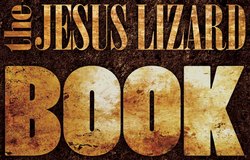Читать книгу The Jesus Lizard Book - The Jesus Lizard - Страница 14
На сайте Литреса книга снята с продажи.
ОглавлениеI’ve always felt David Yow was undervalued as a lyricist. There are several reasons, one being that with the Jesus Lizard, the music itself had a distinctly strong personality. When I think of artists or bands that are known for their lyrics, you can almost always count on the music itself being of a background or accompanimental nature, nothing too disruptive or distracting from the verbal concerns or message being conveyed. With the Jesus Lizard, it was often the other way around: the music itself carried the emotional weight of the song, and the vocals and lyrics served to reinforce that angle or, just as often, go against it. The music often had strong accents, deliberate gaps, and exaggerated dynamic contrasts which Yow would play along with, using the vocals as an additional instrument rather than as a separate component. Most lyricists wouldn’t agree to this.
Then there was Yow’s presentation of those lyrics, especially live, where his overall appearance (disheveled, intoxicated—or was he?), demeanor (angry, confused, or just acting?), and deportment (now here—no, over there—buried in the crowd, hanging from a rafter—hey, I think he might be unconscious) could easily leave one thinking that the words weren’t important, but they were. What I’ve always liked about Yow’s lyrics, going all the way back to Scratch Acid, is that he was never afraid to display his emotional state, whether it was one of vulnerability and regret or agitation and anger. He was just as likely to use metaphor (“Fly on the Wall,” “Cold Water,” Scratch Acid’s “Owner’s Lament”) as he was to use a more journalistic, descriptive style (“Pastoral,” “Mistletoe,” “Then Comes Dudley,” “A Tale of Two Women”) or a straight-up, personal, first-person narrative (“Boilermaker,” “Thumbscrews,” “Seasick”).
He also had some plain old great lines that are permanently fixed in my memory: “Like dust with boots on” from “Zachariah”; “A glow from her hip ignites from shapes she sees” from “Monkey Trick”; “Lies—Placidyls—why don’t you set up a camera to record your own death, dear” from “Blue Shot”; and “Make me another boilermaker” from “Boilermaker,” a simple line which rides the rhythm of the chorus in a direct, repetitive manner . . . why, almost like someone asking for drink after drink . . . but even in this simplicity, the words themselves have a sound and a percussive pattern that overrides the literal meaning—and that’s what makes a great rock lyric.
To sum up, I’ve felt (no, known!) that Yow’s lyrics were as good or better than any of his contemporaries.
DUANE DENISON
